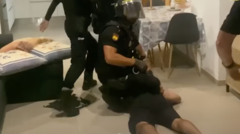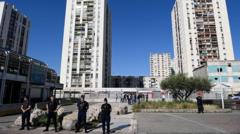Authorities have apprehended 48 individuals linked to a sophisticated narcotics operation, revealing the extent of drug trafficking routes from South America to Europe.
**Cocaine Operation Dismantled in Canary Islands Amid International Raids**

**Cocaine Operation Dismantled in Canary Islands Amid International Raids**
A significant crackdown on cocaine smuggling in the Canary Islands has resulted in widespread arrests and drug seizures.
In a coordinated operation named "Operation Black Shadow," Spanish police and international law enforcement agencies have disrupted a major cocaine trafficking network that used speedboats and a complex logistical setup to transport narcotics from Brazil and Colombia to the Canary Islands. The operation led to the seizure of nearly four tonnes of cocaine and the arrest of 48 suspects across several islands, including Fuerteventura, Gran Canaria, and Lanzarote.
Spain's Policia Nacional reported that the gang utilized 11 narco boats, relying on an abandoned wreck at sea as a refueling station for their illicit activities. The investigation highlighted the gang's advanced methods to evade capture, such as employing an encrypted communications system that included satellite terminals, specialized phones, and coded phrases to maintain secrecy from law enforcement agencies.
The planning phase for these raids stretched over several months and involved cooperation from police forces in Europe, the UK, South America, and the US. This effort culminated in the searching of 29 properties, the confiscation of 69 vehicles, including boats and jet skis, and the recovery of cash, firearms, and drugs.
Europol noted that this operation is vital in understanding the complexities within the international drug smuggling networks, which target Europe as a lucrative market for South American cartels. During the raids, police recovered €100,000 (approx. £84,000/$114,000) alongside weapons, showcasing the extensive resources and reach of the criminal organization.
Spanish authorities declared this operation as a significant blow to one of the largest cocaine trafficking groups. Investigators identified local distributors in the Canary Islands, indicating that the cocaine supply chain is deeply entrenched within the region. The raids were documented in footage showing masked officers conducting searches, arresting suspects, and disrupting planned drug distribution efforts.
This incident highlights ongoing challenges within the drug trade, particularly regarding the interception of cocaine bound for the tourist-heavy Canary Islands, previously noted for significant seizures, including a prior instance in December involving a sunken Venezuelan fishing boat carrying 3.3 tonnes of cocaine, illustrating the persistent threat and complexity of drug trafficking in the region.
Spain's Policia Nacional reported that the gang utilized 11 narco boats, relying on an abandoned wreck at sea as a refueling station for their illicit activities. The investigation highlighted the gang's advanced methods to evade capture, such as employing an encrypted communications system that included satellite terminals, specialized phones, and coded phrases to maintain secrecy from law enforcement agencies.
The planning phase for these raids stretched over several months and involved cooperation from police forces in Europe, the UK, South America, and the US. This effort culminated in the searching of 29 properties, the confiscation of 69 vehicles, including boats and jet skis, and the recovery of cash, firearms, and drugs.
Europol noted that this operation is vital in understanding the complexities within the international drug smuggling networks, which target Europe as a lucrative market for South American cartels. During the raids, police recovered €100,000 (approx. £84,000/$114,000) alongside weapons, showcasing the extensive resources and reach of the criminal organization.
Spanish authorities declared this operation as a significant blow to one of the largest cocaine trafficking groups. Investigators identified local distributors in the Canary Islands, indicating that the cocaine supply chain is deeply entrenched within the region. The raids were documented in footage showing masked officers conducting searches, arresting suspects, and disrupting planned drug distribution efforts.
This incident highlights ongoing challenges within the drug trade, particularly regarding the interception of cocaine bound for the tourist-heavy Canary Islands, previously noted for significant seizures, including a prior instance in December involving a sunken Venezuelan fishing boat carrying 3.3 tonnes of cocaine, illustrating the persistent threat and complexity of drug trafficking in the region.
















